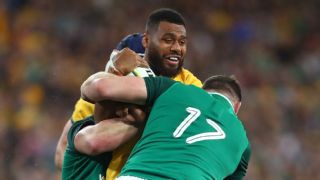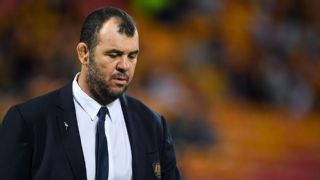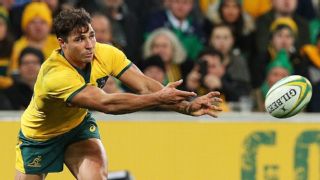|
Michael Cheika has given several players the chance to redeem themselves in the final Test against Ireland, while taking the most obvious course of adding Lukhan Tui to the backrow and promoting Nick Phipps for the injured Will Genia at the scrumbase. Several Australian players would be relieved they remain in the starting lineup - in particular hooker Brendon Paenga-Amosa, who has had his problems at set-piece time, and centre Samu Kerevi, whose erratic defensive capabilities were again exposed in Melbourne. It is clear backup hooker Tolu Latu has yet to convince Cheika he is in the right physical shape to take over, while the alternate No. 13 Tevita Kuridrani is clearly way off side with the national coach. The mail is strong that the relationship between Cheika and Kuridrani has for some time been far from lovey-dovey.  Tui's promotion is understandable after Caleb Timu failed to be prominent in either Test, while Phipps' is Australia's next best No 9. I would still prefer Jake Gordon as the back-up scrumhalf on the bench rather than Joe Powell, as the Waratahs No. 9 is a more dangerous and unpredictable player. But will the tinkering of the lineup lead to a rare June Test series victory? Unlikely. They are necessary changes, rather than ground-breaking alterations. Cheika's selections for the Third Test are at least comprehensible, which is a plus considering his dubious track record. One of Cheika's chief failings is that he has often been a sub-standard selector. He has in fact been among the Wallabies poorer selectors of recent decades. Bob Dwyer and Alan Jones were astute. Rod Macqueen and Eddie Jones had their moments. Robbie Deans made the mistake of latching onto the Three Amigos- Kurtley Beale, James O'Connor and Quade Cooper- who let him down with their often impetuous behaviour. His leaning towards the brat pack had the detrimental effect of the team elders losing faith in the national coach. If a coach doesn't have the full backing of the team's senior group, he is already one foot out the exit door. But Deans could select. Cheika is more in the Greg Smith category - often all over the place, wasting numerous moments with unnecessary experimentation, and confounding many candidates by relentless chopping and changing. At club and provincial level, Smith was the master of making eight to ten personnel changes week by week. He was slightly more conservative when Wallabies coach, but most of the time the players had absolutely no idea what Smith was up to. Not surprisingly, Smith's axing as Wallabies coach in 1997 was traumatic. Sometimes Cheika has appeared as desperate, seemingly making alterations for the sake of it - as shown by him picking in his squads the exorbitantly high number of 65 players in 2016-17 of which 27 were on debut. Australia's most exclusive club involves those local Super Rugby players who haven't been picked in a Wallabies squad.  The most abysmal example of his haphazard approach occurred following the Wallabies 27-19 win over the All Blacks in Sydney in August, 2015. This was the most dynamic of Australian performances, and the players should have been rewarded the following week in Auckland, especially with the Bledisloe Cup at last a chance of heading west. Instead Cheika made several senseless changes, demoting numerous crucial Sydney performers, and not surprisingly the team was belted 41-13 at Eden Park. The moment to win the Cup was lost due to poor selection. A year out from the next World Cup, it is time for some selection consistency. The chopping and changing has to stop. Cheika did pick the right teams for the First and Second Test. It was based on form, and the Wallabies took advantage of Joe Schmidt fiddling around with his first Test line-up by controlling the game virtually from the kickoff. But when the real Irish line-up appeared for the second Test, Australia were always going to struggle, because of a long-standing problem of being unable to back-up, and getting flustered whenever an opponent plays 'in-your-face' football. Ireland are masters of that. It is a prime reason why Ireland have beaten Australia in four of their last six encounters. As usual, the Wallabies defence soon frayed, the penalties piled up, while Australia, who for decades relied on only minimal possession as their pack was constantly monstered by international teams, no longer know how to live off scraps.  Ireland did their research in how to stifle Wallabies fullback Israel Folau. As numerous recent Bledisloe Cup matches have confirmed, restrict Folau's space, inhibit his running lines, crowd him, and he soon either succumbs to the pressure or has little impact on the result. Also when pressured, Folau's passing becomes flaky. For a long time, All Blacks have known exactly how to cage Folau. Ireland have now twigged. As for the Third Test, expect more of the same. Genia is an enormous loss, and while Phipps is an honest scrapper, he is not on the same level as Conor Murray. It's a similar scenario with Johnny Sexton and Bernard Foley. Sexton was in complete control in Melbourne, and knows how to guide a swarming, clever pack. Foley needs a regular flow of possession to have an impact. Ireland know how to suppress that. Ireland by 8.
|
